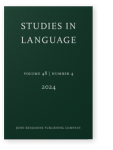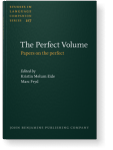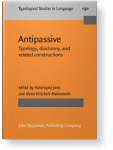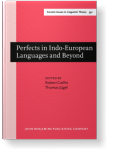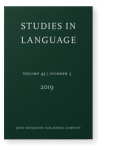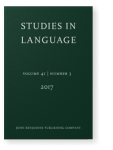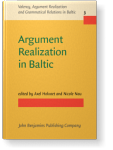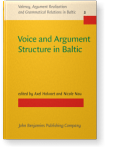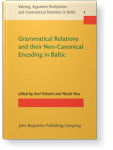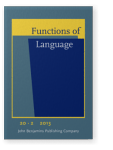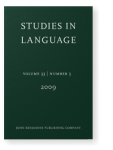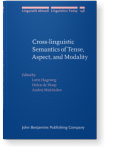Peter M. Arkadiev
List of John Benjamins publications for which Peter M. Arkadiev plays a role.
Journal
2021 Chapter 6. Perfect and negation: Evidence from Lithuanian and sundry languages The Perfect Volume: Papers on the perfect, Eide, Kristin Melum and Marc Fryd (eds.), pp. 137–162 | Chapter
I analyze the interaction of the periphrastic perfect and negation in Lithuanian, where the negative prefix can attach both to the auxiliary and to the lexical verb. I argue that the position of negation correlates with its semantic scope with respect to the perfect. The Lithuanian data are… read more
2021 Chapter 15. Indirect antipassive in Circassian Antipassive: Typology, diachrony, and related constructions, Janic, Katarzyna and Alena Witzlack-Makarevich (eds.), pp. 483–514 | Chapter
The article focuses on antipassive formation in Adyghe and Kabardian (Circassian < West Caucasian), polysynthetic languages with ergative alignment of basic morphosyntax. The Circassian antipassive is typologically unusual in several respects. First, it is derived not only from transitive, but… read more
2020 Chapter 5. Perfects in Baltic and Slavic Perfects in Indo-European Languages and Beyond, Crellin, Robert and Thomas Jügel (eds.), pp. 123–214 | Chapter
This survey presents a comprehensive account of perfect constructions (based on an anteriority participle and an often optional auxiliary) in Baltic and Slavic over space and time, including dialects and high-contact minority varieties. Based on a classification by participle types and their… read more
2019 Differential nominal marking in Circassian Studies in Language 43:3, pp. 715–751 | Article
In this paper we describe a peculiar pattern of case alternation from the polysynthetic Circassian (West Caucasian) languages, where specificity-driven differential marking of noun phrases is attested in all syntactic positions and with the absolutive and the oblique cases alike. We call this… read more
2017 Multiple ergatives: From allomorphy to differential agent marking Studies in Language 41:3, pp. 717–780 | Article
This paper presents a cross-linguistic survey of case systems with several non-phonologically distributed markers of ergative case, based on a convenience sample of more than 70 languages from all over the world. It is shown that in most languages the distribution of different ergative markers… read more
2016 Long-distance Genitive of Negation in Lithuanian Argument Realization in Baltic, Holvoet, Axel and Nicole Nau (eds.), pp. 37–82 | Article
This paper investigates the phenomenon of the replacement of Accusative case marking on the direct object of a transitive infinitive (or, rarely, participle) by the Genitive when the non-finite clause is embedded under a negated matrix verb. Basing myself on data collected from native speakers,… read more
2015 Lithuanian morphological causatives: A corpus-based study Voice and Argument Structure in Baltic, Holvoet, Axel and Nicole Nau (eds.), pp. 39–98 | Article
We analyse morphological causative verbs in Lithuanian on the basis of an annotated corpus, studying the distribution of different causative suffixes across the valency types of base verbs, as well as the argument structure of the causatives themselves. We show that different causative suffixes are… read more
2014 Case and word order in Lithuanian infinitival clauses revisited Grammatical Relations and their Non-Canonical Encoding in Baltic, Holvoet, Axel and Nicole Nau (eds.), pp. 43–95 | Article
This paper considers the Lithuanian constructions with the Dative and Genitive marking of direct objects of transitive verbs in purpose infinitival clauses, studied in Franks and Lavine (2006). I adduce empirical evidence and conceptual arguments both speaking against the analysis proposed by… read more
2013 Review of Kibrik (2011): Reference in Discourse Functions of Language 20:2, pp. 294–306 | Review
2009 Review of Kulikov, Malchukov & de Swart (2006): Case, Valency and Transitivity Studies in Language 33:3, pp. 738–748 | Review
2009 Lexical and compositional factors in the aspectual system of Adyghe Cross-linguistic Semantics of Tense, Aspect, and Modality, Hogeweg, Lotte, Helen de Hoop and Andrej L. Malchukov (eds.), pp. 55–82 | Article
This paper deals with different components of aspectual interpretation in Adyghe, a polysynthetic North-West Caucasian language, and hierarchical relations among them. Following Tatevosov (2002), I propose a classification of Adyghe predicates into actional classes, and then show how this… read more
